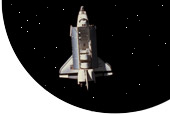December 3, 2001 Space News, , page 19: Play "Space Card" Against Source of Islamic Terrorism
In the culture war against the bin Laden religious fanatics, the West and its Muslim allies have many unappreciated strengths. As the United States launches new public relations campaigns to neutralize the cultural roots of such fanaticism, one strong suit it needs to play to is the striking metaphor of space exploration as a symbol of the future vs. the past.
Sending humans into space is often considered a dual monopoly of the United States and Russia, with their junior partners in allied nations. But even the Western public would be surprised to learn that seven men from Islamic cultures are among the 400-odd humans who have voyaged into orbit. These men need to be recruited as spokesmen for the values that their space missions represent. Their achievements, if more widely advertised in the Muslim world, would inspire millions of their cultural compatriots.
Islamic extremists recognize the cultural threat from the powerful impact of space flight on the world public and even on ordinary people in Muslim nations. In Pakistan, they have acted to deflect the threat by declaring 'kaffir' (non-believer) the entire idea that humans have traveled to the moon, proclaiming that such voyages are forbidden by the Koran.
One Lebanese mullah who claimed that Allah would never allow mortal men to touch the purity of the celestial moon was mocked by critics who laughed that Apollo astronauts had not merely touched the moon, they had left human waste on it - a claim so outrageous to the mullah that he declared that people saying such 'lies' should be killed.
Modernist and moderate Muslims the world over have never had any problems with the concept of humans walking on the moon, since Mohammed himself denounced pagan moon worshippers. And the scientist in charge of teaching Apollo astronauts about lunar geology was a devout Muslim named Farouk El-Baz, now at Boston University. El-Baz sent the first chapter of the Koran to the moon aboard Apollo-15, with an inscribed prayer to protect the mission and its crew. This illustrates the friendship and mutual respect between him and the Apollo astronauts.
For those misled into disbelieving space travel on supposedly religious grounds, the evidence of their own eyes should be enough to convince them that it is truly occurring, as claimed. Western radio broadcasts should make more effort to announce the dawn and dusk over flights of easily visible space vehicles such as the international space station, which is brighter than any star in the sky.
The lesson should be stressed that such man-made facilities are available to all nations who seek to progress into the future together rather than recede into a mythical past. There is a place for modernist Islamic societies on this new frontier, and history has proven this even as most of the world remains ignorant about it.
Actual Islamic space travelers include a Saudi Arabian businessman who flew on a space shuttle in 1985 as a representative of his communications satellite company, which had booked a launching of one of its payloads, and an Afghan pilot who was taken on a Soviet space flight as a propaganda show but whose sharp eyes caught a potentially fatal flaw during the return to Earth, and thereby saved the lives of the entire crew.
The Saudi was Sultan Salman al-Saud, a minor royal prince; the Afghan was Abdul Ahad Mohmand, now in exile in Stuttgart, Germany, after death threats from the Taliban government. Another guest-cosmonaut aboard a Soviet space mission in 1987 was Syrian pilot Muhammed Ahmed Faris.
Two pilots from Kazakhstan, with the 'russified' last names of Aubakirov and Musabayev, have been aboard the space stations, and Talgat Musabayev has commanded both a Mir space station crew and the first-ever 'space tourist' mission last April. Another Soviet cosmonaut, Musa Manarov, is from Daghestan in the Caucasus; he was on the first space station crew to spend a full year in outer space. Russian pilot-cosmonaut Salizhan Sharipov, an Uzbek from Kirghizia in Central Asia, flew aboard an American space shuttle in 1998 and is slated to command a new mission next year.
These men were raised in Islamic cultures but have joined the select cadre of the symbol of the future, space travelers. They should be called upon to speak out widely about how Muslim people can enter the future successfully, and how valuable such an activity can be. These 'space aces' have been hidden away, unrecognized and unused, for too long.
The Challenger disaster in 1986 denied the Muslim world an even better role model, a female space traveler. She was Dr. Pratiwi Sudarmono, a physician with a doctorate in microbiology, who had been designated to accompany an Indonesian communications satellite into orbit. She also had developed plans for performing a classic Indonesian dance in zero gravity. Dr. Sudarmono, now 49, was recently selected by the Fulbright Foundation to take part in a global health issues project.
There is no lack of other highly-educated Muslim women, perhaps from Egypt, Bangladesh, Turkey or elsewhere, who could perform worthy space experiments and even more high-value public relations back on Earth.
After all, from time to time, the space shuttle carries diplomatic passengers to serve U.S. worldwide interests, so the precedent has been set. The first French and Russian passengers on a shuttle mission were for those purposes, as was a guest from Ukraine. Dozens of other non-U.S. citizens have flown as full-fledged crew members. On White House orders, NASA had even accepted two military jet pilots from Israel to train as astronauts, and one is slated to fly into space early next year. (Considering the changed diplomatic priorities since Sept. 11, perhaps some rescheduling of that mission might be considered.)
So space flight is a powerful and under-exploited tool in the struggle for the minds of people around the world, and especially in the Muslim world. The ferocity of the Islamic fanatic hostility to the idea of space travel shows the high degree of fear these people have for such powerful symbols.
Whether in denying the reality of modern space flight, or threatening the lives of their kindred people who have traveled into space, these extremists have let us know what a powerful propaganda tool against them such concepts are.
That alone should be reason enough for Western public relations strategists to seize this unearthly opportunity, and play to our own strengths as the leader in space exploration, a symbol of a future all the forward-looking world can take part in. It's more than just a gimmick; it's the reality that space enthusiasts have been advocating for decades.
By stressing these lessons, celebrating past achievements, and even organizing future space missions for modern Muslim astronauts and cosmonauts, the United States can use its space program to help counter the appeal of back-to-the-past fundamentalism and thereby dilute the worldwide appeal of the terrorism option. |

